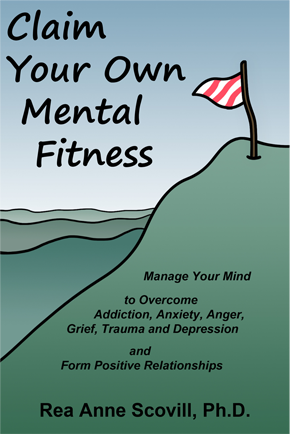Claim Your Own Mental Fitness
Manage Your Mind to Overcome Addiction, Anxiety, Anger, Grief, Trauma & Depression and Form Positive Relationships
Scovill’s guide – a standout in the self-help genre – tackles the messiness of life with candor and warmth. A valuable, realistic, compassionate guide for taking control of one’s thinking.
Read the full Kirkus Review
Chapter Summaries
Learn Wisely to Learn Well
Describes how you can use basic scientific principles to help you learn how to manage your mind effectively and comfortably.
Prepare Your Brain
Gives practical guidance for how to prepare for a good night’s sleep. Your brain can’t learn well when it’s tired.
Keep Your Cool
Explains how you can discover and prevent the hidden misunderstanding in your mind that triggers fight-or-flight reactions.
Meet and Reprogram Your Inner Family
Identifies the main parts of your mind and how they developed. Relates each part to recognizable feelings and beliefs that can be modified to improve your mental fitness. Offers tools you can use throughout your day to manage your mind better.
Self-Care, Self-Control and Self-Esteem
Describes how you can use your new tools to implement more positive brain function. Explains how improved capacity to manage and care for your mind leads to stable self-control and self-esteem.
Individual Differences
Addresses how inherited differences can affect your ability to manage your mind for mental fitness. Describes ways you can work around your own and others’ limitations to improve your capacity to cope.
Addiction: Tootle and the Field of Flowers
Describes how addiction works on many levels to derail your mental fitness. Offers tools that support sobriety and lasting self-esteem.
Anxiety Issues
Describes how lifestyle and mental habits cause anxiety symptoms. Addresses short-term as well as more entrenched anxiety disorders. Offers a quick and powerful method to shut down a panic attack or other intense fight-or-flight reactions. Discusses medication issues for anxiety.
The Grief Process and the Resolution of Anger
Describes how getting stuck in the angry stage of grief can undermine healing for a lifetime. Defines how to recognize and manage anger. Explains how to move through the grief process into stable mental fitness.
Dissociation, Self-Preservation and Post-Traumatic Stress Disorder
Demystifies dissociation, describing how it allows you to adapt and survive in a wide range of life situations. Describes trauma’s impact on your mind and steps for re-associating traumatic memories. Identifies beliefs that cause avoidance of treatment and healing.
Release the Grip of Depression
Describes how to overcome and prevent recurrence of depression. Addresses medication, heredity and relationship issues for depressed people. Briefly addresses bipolar-spectrum disorders and their special requirements.
Keep Your Adult in Charge for Life
Addresses how to stay on track by developing goals in key life categories. Suggests how to ensure that you hold beliefs and values that will maintain your mental fitness at good levels through stress for the rest of your life.
Friendship Holds the Keys
Defines the elements of a relationship that allow it to deepen and grow over the years, as we hope our friendships will. Examines the beliefs that undermine friendship, and offers more flexible ways to look at friends. Describes how to cope when friendships wane.
Acquaintance Skills: Civility and Smooth Cooperation
Suggests how expectations for friendship should differ from those for acquaintance relationships. Explores how toxic beliefs can interfere with relationships at work, with neighbors and in community groups. Discusses issues unique to each of these areas.
Relatives and Expectations
Looks at how toxic beliefs can impact how you get along with your siblings, parents and extended families. Suggests using concepts for relating to friends and acquaintances to help define what’s feasible with each relative.
Dating Fantasies and Realities
Describes how toxic beliefs can interfere when you try to find an intimate partner. Suggests ways to use acquaintance skills to get to know a lot of prospects and friendship concepts to evaluate whether a prospect qualifies for a long-term relationship. Offers tips to help lead you away from especially negative prospects.
Marriage for Intimacy and Partnership
Describes the relationship between friendship and marriage. Explores how marriage can trigger beliefs that prevent intimacy, both sexual and emotional. Suggests ideas for how to create a home that supports mental fitness for both of you and your children.
Adult and Wise Parenting for Mentally Fit Children
Describes how to strengthen your mental fitness to help you meet the needs of your developing children. Integrates concepts from previous chapters to help you manage your kids as unique individuals. Discusses the twelve toxic beliefs and how they can sabotage your parenting. Offers techniques that can help you lead your kids into mental fitness and build your own along the way.
The Thirteen Toxic Beliefs and Happy Endings
Challenges you to have courage and commitment to yourself as you work to develop the wise beliefs and expectations you need to enjoy the happy ending of mental fitness.



